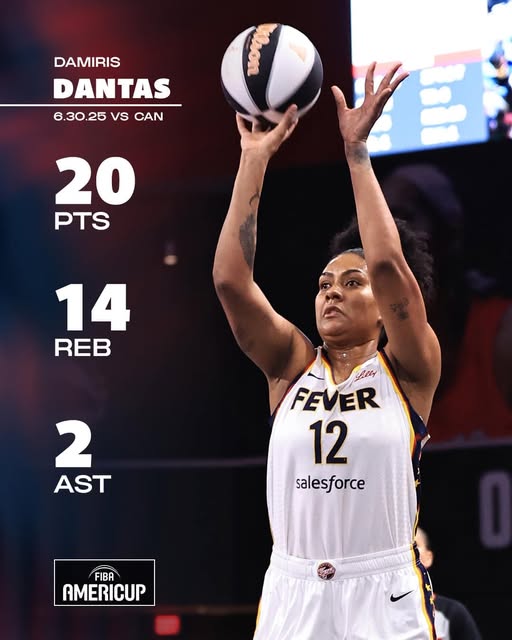Brazil and Canada entered the court in Santiago with something on the line: Brazil riding a wave of performance and seeking to assert dominance in Group A, while Canada, unbeaten until this point, aimed to maintain its momentum. It was in this charged atmosphere that Damiris Dantas—an experienced veteran and cornerstone of the Brazilian side—delivered a performance that not only tilted the balance of this game but helped shape the narrative of the tournament so far.
From the opening whistle, Canada looked sharp, matching Brazil’s intensity. But Brazil managed to hold a narrow lead early on. As the game progressed, the Canadians found rhythm in the mid-quarters, applying defensive pressure and chipping away at Brazil’s advantage, swinging control in their favor by halftime. That ebb and flow set the stage for what would become a thrilling comeback led by Damiris Dantas.
Dantas carried Brazil on her back in the fourth quarter. Her impact was more than scoring—though she led all scorers with a dominant 20‑point, 14‑rebound double‑double—it was the way she asserted herself in critical moments. Her presence in the paint altered Canada’s offense, her boards ended possessions, her scoring punctuated momentum swings, and her composure under pressure lifted her teammates. This wasn’t just another stat line—it was a statement that Brazil could lean on one of its most seasoned international players when challenges arose (tsn.ca).
Watching the scoreboard inch toward the contest’s climax, Canada clung to a precarious lead at the start of the fourth quarter. But as the final frame unfolded, Brazil’s energy surged. Every defensive stand, every offensive set ended with Dantas crashing the glass or converting a key basket. Brazil out-rebounded Canada 47–38 overall and held the edge in assists 23–14, winning the intangible battles of court control .
While Kamilla Cardoso’s presence was also pivotal—her 19 points, 11 rebounds, 5 blocks, and 3 steals earned her Player of the Game honors—Dantas’ role was catalytic. Cardoso’s flawless 7-for-7 free throws came in part because Dantas’ sustained interior threat forced Canada to collapse defensively, opening lanes and mental space (fiba.basketball).
Brazil’s ability to score under pressure and dominate paint scoring—30 points down low—reflected a cohesive offensive strategy. Dantas was central to that strategy, operating as both scorer and distributor inside. Her presence commanded attention, creating opportunities for teammates, and her physicality earned second chances. Canada, attempting to compensate by playing on the perimeter, shot just 27.9% from two-point range, lagging behind Brazil’s 40% (fiba.basketball).
Throughout the final quarter, Canada’s offense repeatedly broke down on critical possessions. Missed threes and turnovers followed by Brazil rebounds became a recurring theme. And each time Canada threatened to rally, Dantas responded—snatching a board, pushing the ball in transition, hitting a mid-range jumper, drawing fouls, crashing the offensive glass again. The energy and experience she brought to the moment were unmistakable.
Her 20-point tally also pushed her career scoring total in AmeriCup events to 370, placing her just 11 points shy of overtaking Kim Gaucher’s 380 for second all-time (fiba.basketball). For a player with roots in youth-level prominence—MVP and leading scorer/rebounder at the 2011 U‑19 World Championship—this milestone underscores a consistent international excellence spanning more than a decade .
As the game clock dwindled, Brazil gradually extended the lead to as much as 10 points. The final buzzer confirmed a 74–65 win—a victory earned not just by Dantas’ stats, but by her ability to influence game tempo, demand respect in the lane, and ignite collective performance.
Looking at Canada’s performance, this was a tough but instructive first loss in the group stage. They earned some positives—Kayla Alexander grabbed her 200th rebound at the tournament and eclipsed the national team record in that category—but Brazil’s superior rebounding and assists proved decisive (fiba.basketball). Canada struggled to break into rhythm, often missing free-flowing offensive moments that defined their earlier games. Their 38–47 rebound deficit, combined with 14 to 23 in assists, was a telling mismatch in fundamentals .
Brazil’s playbook was efficient: attack the paint, crash the glass relentlessly, move the ball zoning or doubling when Canada collapsed, and trust in free throw execution. Cleaning the defensive glass ensured transition opportunities, and missing just a couple mid-range and free-throw chances would have painted an even larger margin than the final nine points.
From first throw-in to final buzzer, Dantas’ maturity elevated Brazil. She played like a veteran accustomed to closing out games—a trait that can’t be manufactured. Her scoring threat was only magnified by her rebounding, giving the team multiple chances per possession. Her awareness in high-pressure moments, such as reading rotations and setting teammates up, speaks to a player who’s grown in both skill and basketball IQ since her breakout U‑19 tournament so many years ago .
Beyond the individual win, this victory shifts the AmeriCup narrative. Brazil, by defeating a top rival, remains unbeaten, securing a psychological edge and positioning themselves as serious contenders for the title. For Canada, this loss offers a reality check: passion, skill, and effort are essential—but without controlling the boards and sharing playmaking duties via assists, they’ll struggle against experienced, cohesive teams.
Canada’s head coach now faces questions: how to rebuild momentum, how to adjust rotations—do they rely more on Alexander’s interior dominance, or try to generate more offensive fluidity by pushing for perimeter efficiency? They must improve rebounding discipline and decision-making to avoid a repeat in later matchups.
For Brazil, the performance shows alignment—players in sync with game plan, chemistry in clutch moments, and an ability to rise under pressure. If Dantas continues to push toward that historic scoring milestone, she’ll not only elevate her own legacy but will pull Brazil forward with her. Watching the final buzzer cascade into a celebration, one sees not just a win, but a statement: this team has the leadership, talent, and tenacity to make deep runs.
On the larger stage of FIBA Women’s AmeriCup 2025, this game will serve as a pivotal turning point. It exemplifies the highest levels of international competition: tight margins, star power, execution under pressure, and a sense of narrative continuity. For Brazil, securing this result keeps them in elite company and inspires belief. For Dantas personally, it’s another notch in her storied career—a veteran still achieving, still influencing, still breaking records.
In the coming days, attention will pivot to Brazil’s next opponents, as well as Canada’s recovery and adjustments. But for tonight, the headlines belong to Damiris Dantas—the player who “delivered in the second game of #AmeriCupW play,” leading scorers and orchestrating Brazil’s power play to leave Canada stunned (instagram.com, facebook.com).
Her performance reminds fans why experience matters. When the game tightens and nerves fray, she remains calm, hungry, dominant. In that crucible of pressure, she confirms why she remains a figure of respect across continents.
As stats settle, storylines deepen: Dantas moves toward becoming the AmeriCup’s second all-time scorer; Brazil maintains group dominance; Canada must regroup—but the tournament’s momentum has shifted.
This game will stand as a proud moment for Brazil—a microcosm of strategy, will, performance. And Dantas, as she kisses the ball at game’s end, will do so not just as a scorer but as the fulcrum upon which a nation’s hopes pivot in this continental contest.
In international basketball, where national honor meets tactical acumen and sheer talent, few performances are as impactful. Damiris Dantas anchored Brazil’s AmeriCup momentum with a peak performance, reminding the world that on the grandest platforms, seasoned veterans still define destiny.



